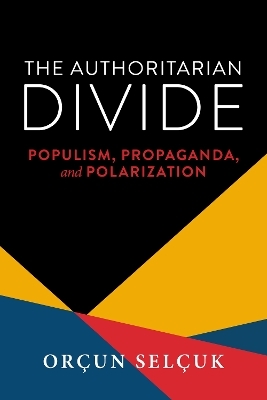
The Authoritarian Divide
Populism, Propaganda, and Polarization
Seiten
2024
University of Notre Dame Press (Verlag)
978-0-268-20807-3 (ISBN)
University of Notre Dame Press (Verlag)
978-0-268-20807-3 (ISBN)
In the context of the global decline of democracy, The Authoritarian Divide analyzes the tactics that populist leaders in Turkey, Venezuela, and Ecuador have used to polarize their countries.
Political polarization is traditionally viewed as the result of competing left/right ideologies. In The Authoritarian Divide, Orçun Selçuk argues that, regardless of ideology, polarization is driven by dominant populist leaders who deliberately divide constituents by cultivating a dichotomy of inclusion and exclusion. This practice, known as affective leader polarization, stymies compromise and undermines the democratic process.
Drawing on multiple qualitative and quantitative methodologies for support, as well as content from propaganda media such as public speeches, Muhtar Meetings, Aló Presidente, and Enlace Ciudadano, Selçuk details and analyzes the tactics used by three well-known populist leaders to fuel affective leader polarization: Recep Tayyip Erdoğan in Turkey, Hugo Chávez in Venezuela, and Rafael Correa in Ecuador. Selçuk’s work provides a rubric for a better understanding of—and potential defense against—the rise in polarizing populism across the globe.
Political polarization is traditionally viewed as the result of competing left/right ideologies. In The Authoritarian Divide, Orçun Selçuk argues that, regardless of ideology, polarization is driven by dominant populist leaders who deliberately divide constituents by cultivating a dichotomy of inclusion and exclusion. This practice, known as affective leader polarization, stymies compromise and undermines the democratic process.
Drawing on multiple qualitative and quantitative methodologies for support, as well as content from propaganda media such as public speeches, Muhtar Meetings, Aló Presidente, and Enlace Ciudadano, Selçuk details and analyzes the tactics used by three well-known populist leaders to fuel affective leader polarization: Recep Tayyip Erdoğan in Turkey, Hugo Chávez in Venezuela, and Rafael Correa in Ecuador. Selçuk’s work provides a rubric for a better understanding of—and potential defense against—the rise in polarizing populism across the globe.
Orçun Selçuk is an assistant professor of political science and the director of the international studies program at Luther College.
List of Figures
List of Tables
Preface
Acknowledgements
List of Abbreviations
Introduction
1. A Theory of Populism, Polarization, and Opposition
2. Affective Leader Polarization in Turkey, Venezuela, and Ecuador
3. Inclusionary and Exclusionary Populism in Turkey under Erdoğan
4. Inclusionary and Exclusionary Populism in Venezuela under Chávez
5. Inclusionary and Exclusionary Populism in Ecuador under Correa
6. Opposition to Affective Leader Polarization in Turkey, Venezuela, and Ecuador
Comparative Conclusions
Appendix 1
Appendix 2
Appendix 3
Bibliography
| Erscheinungsdatum | 05.07.2024 |
|---|---|
| Reihe/Serie | Kellogg Institute Series on Democracy and Development |
| Zusatzinfo | 23 Graphs; 1 Diagrams; 21 Tables, black and white |
| Verlagsort | Notre Dame IN |
| Sprache | englisch |
| Maße | 152 x 229 mm |
| Themenwelt | Geisteswissenschaften ► Geschichte ► Allgemeine Geschichte |
| Geisteswissenschaften ► Geschichte ► Regional- / Ländergeschichte | |
| Sozialwissenschaften ► Politik / Verwaltung ► Politische Systeme | |
| Sozialwissenschaften ► Politik / Verwaltung ► Politische Theorie | |
| Sozialwissenschaften ► Politik / Verwaltung ► Vergleichende Politikwissenschaften | |
| ISBN-10 | 0-268-20807-7 / 0268208077 |
| ISBN-13 | 978-0-268-20807-3 / 9780268208073 |
| Zustand | Neuware |
| Haben Sie eine Frage zum Produkt? |
Mehr entdecken
aus dem Bereich
aus dem Bereich
eine Familiengeschichte der Menschheit
Buch | Hardcover (2023)
Klett-Cotta (Verlag)
CHF 68,60
Eine wahre Geschichte von Schiffbruch, Mord und Meuterei
Buch | Hardcover (2024)
C.Bertelsmann (Verlag)
CHF 34,95


